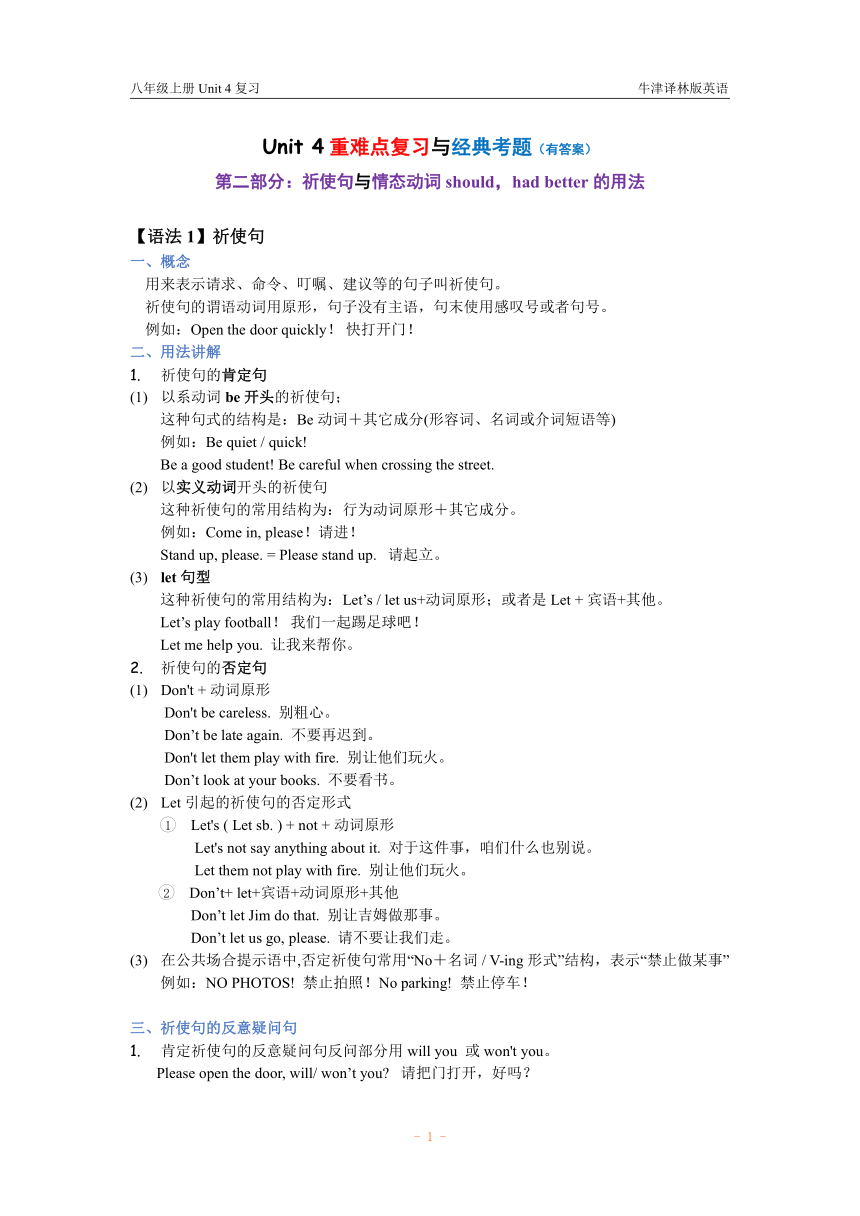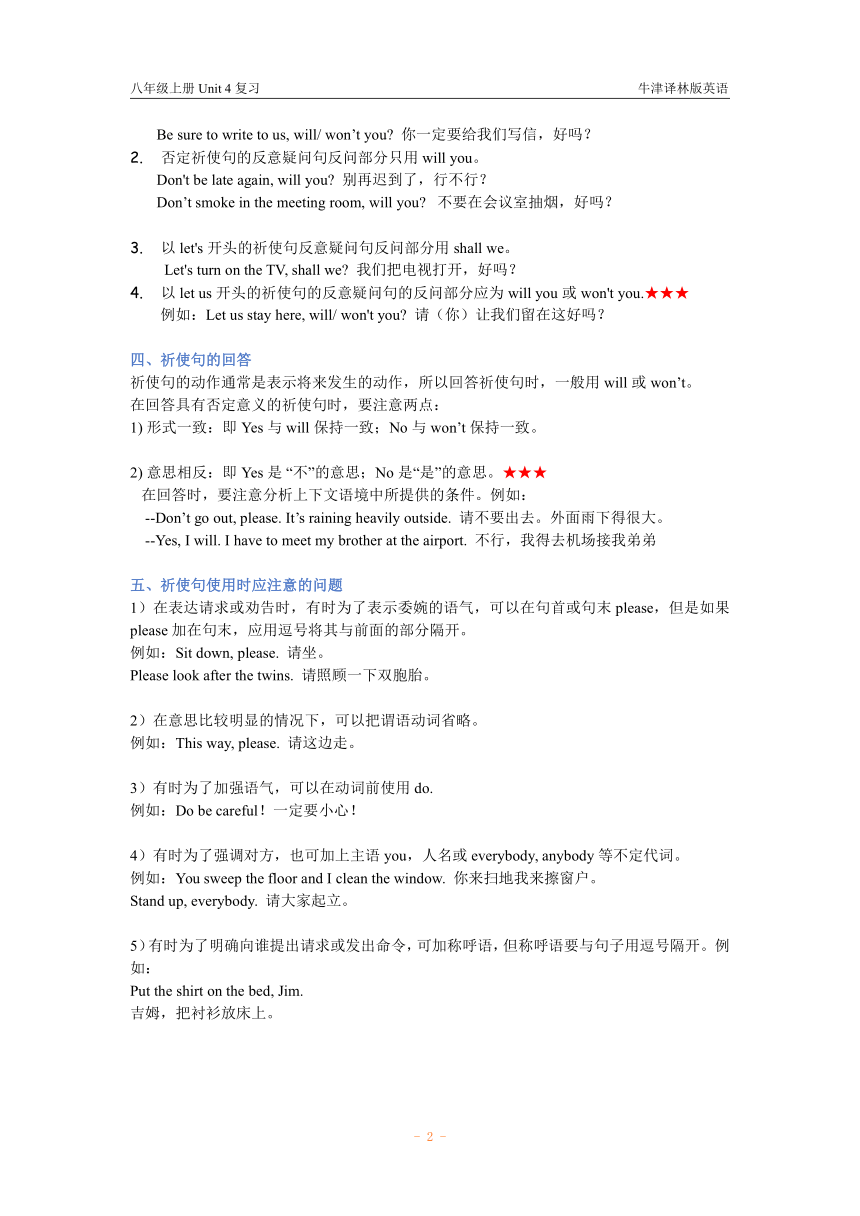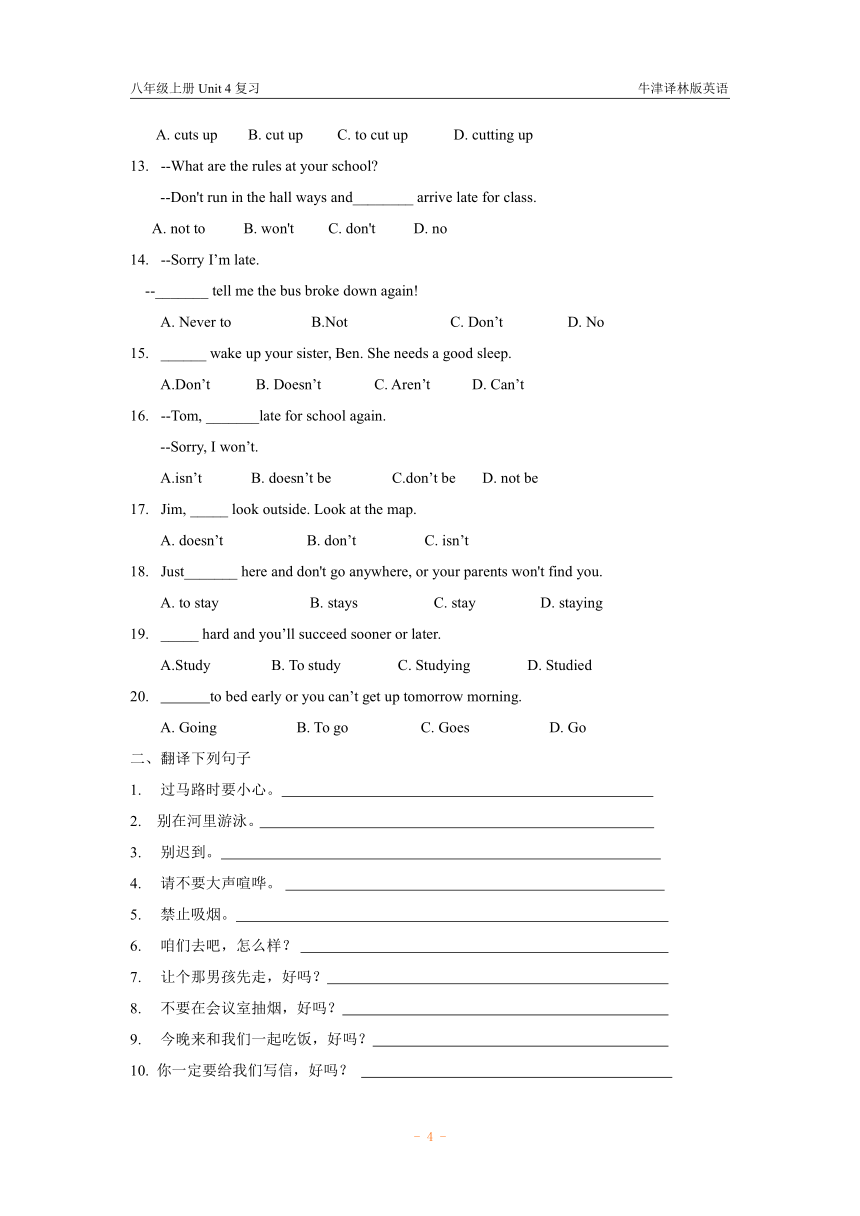牛津译林版八年级上册Unit 4 Do it yourself语法讲解+专项训练(含解析)
文档属性
| 名称 | 牛津译林版八年级上册Unit 4 Do it yourself语法讲解+专项训练(含解析) |  | |
| 格式 | zip | ||
| 文件大小 | 33.7KB | ||
| 资源类型 | 教案 | ||
| 版本资源 | 牛津译林版 | ||
| 科目 | 英语 | ||
| 更新时间 | 2022-10-15 15:33:18 | ||
图片预览




文档简介
八年级上册Unit 4复习 牛津译林版英语
Unit 4重难点复习与经典考题(有答案)
第二部分:祈使句与情态动词should,had better的用法
【语法1】祈使句
概念
用来表示请求、命令、叮嘱、建议等的句子叫祈使句。
祈使句的谓语动词用原形,句子没有主语,句末使用感叹号或者句号。
例如:Open the door quickly! 快打开门!
用法讲解
祈使句的肯定句
以系动词be开头的祈使句;
这种句式的结构是:Be动词+其它成分(形容词、名词或介词短语等)
例如:Be quiet / quick!
Be a good student! Be careful when crossing the street.
以实义动词开头的祈使句
这种祈使句的常用结构为:行为动词原形+其它成分。
例如:Come in, please!请进!
Stand up, please. = Please stand up. 请起立。
let句型
这种祈使句的常用结构为:Let’s / let us+动词原形;或者是Let + 宾语+其他。
Let’s play football! 我们一起踢足球吧!
Let me help you. 让我来帮你。
祈使句的否定句
Don't + 动词原形
Don't be careless. 别粗心。
Don’t be late again. 不要再迟到。
Don't let them play with fire. 别让他们玩火。
Don’t look at your books. 不要看书。
Let引起的祈使句的否定形式
Let's ( Let sb. ) + not + 动词原形
Let's not say anything about it. 对于这件事,咱们什么也别说。
Let them not play with fire. 别让他们玩火。
Don’t+ let+宾语+动词原形+其他
Don’t let Jim do that. 别让吉姆做那事。
Don’t let us go, please. 请不要让我们走。
在公共场合提示语中,否定祈使句常用“No+名词 / V-ing形式”结构,表示“禁止做某事”
例如:NO PHOTOS! 禁止拍照!No parking! 禁止停车!
祈使句的反意疑问句
肯定祈使句的反意疑问句反问部分用will you 或won't you。
Please open the door, will/ won’t you 请把门打开,好吗?
Be sure to write to us, will/ won’t you 你一定要给我们写信,好吗?
否定祈使句的反意疑问句反问部分只用will you。
Don't be late again, will you 别再迟到了,行不行?
Don’t smoke in the meeting room, will you 不要在会议室抽烟,好吗?
以let's开头的祈使句反意疑问句反问部分用shall we。
Let's turn on the TV, shall we 我们把电视打开,好吗?
以let us 开头的祈使句的反意疑问句的反问部分应为will you或won't you.★★★
例如:Let us stay here, will/ won't you 请(你)让我们留在这好吗?
祈使句的回答
祈使句的动作通常是表示将来发生的动作,所以回答祈使句时,一般用will或won’t。
在回答具有否定意义的祈使句时,要注意两点:
1) 形式一致:即Yes与will保持一致;No与won’t保持一致。
2) 意思相反:即Yes是 “不”的意思;No是“是”的意思。★★★
在回答时,要注意分析上下文语境中所提供的条件。例如:
--Don’t go out, please. It’s raining heavily outside. 请不要出去。外面雨下得很大。
--Yes, I will. I have to meet my brother at the airport. 不行,我得去机场接我弟弟
祈使句使用时应注意的问题
1)在表达请求或劝告时,有时为了表示委婉的语气,可以在句首或句末please,但是如果please加在句末,应用逗号将其与前面的部分隔开。
例如:Sit down, please. 请坐。
Please look after the twins. 请照顾一下双胞胎。
2)在意思比较明显的情况下,可以把谓语动词省略。
例如:This way, please. 请这边走。
3)有时为了加强语气,可以在动词前使用do.
例如:Do be careful!一定要小心!
4)有时为了强调对方,也可加上主语you,人名或everybody, anybody等不定代词。
例如:You sweep the floor and I clean the window. 你来扫地我来擦窗户。
Stand up, everybody. 请大家起立。
5)有时为了明确向谁提出请求或发出命令,可加称呼语,但称呼语要与句子用逗号隔开。 例如:
Put the shirt on the bed, Jim.
吉姆,把衬衫放床上。
【祈使句专项练习】有答案
一、单项选择
________ this rock music, please. I’m afraid some people can’t stand the noise!
A.Stopping B. Stop C. Stops D. Stopped
Jack, , or you will get heavier.
A. doesn’t play sports anymore B. doesn’t eat so much meat
C. don’t play sports any more D. don’t eat so much meat
_____ get off the bus before it stops.
A. Don’t B. Doesn’t C. Didn’t
______ out your love. The world will become a nicer place to live in.
A. Speak B. To speak C. Spoke D. Speaking
________ call me Wang Wang! It’s my dog’s name.
A. Not B.No C. Don’t
--It’s late, Teresa. earlier next time and you’ll have enough time to have breakfast.
--OK, Mum. I’ll remember.
A. Get up B. Getting up C. To get up
Tom,______ afraid of speaking in front of people. You are the best one.
A. don’t B. not C. not be D. don’t be
--Jim, ________ read books while you are walking in the street. It's very dangerous.
--OK, thank you.
A. doesn't B.don’t C.won't D.can't
--__________ up, Anna. It’s seven thirty.
—One more minute, Mum.
A. Get B. Gets C. Getting D. Got
“______ exercise every day, my son. It’s good for your health.” Dad often said to him.
A. Takes B. Taking C. Take D. To take
_____ hard and you’ll succeed sooner or later.
A. Studying B. To study C. Study D. Studied
--Put some butter on a slice of bread and add a teaspoon of butter. What else
--Next ________some tomatoes.
A. cuts up B. cut up C. to cut up D. cutting up
--What are the rules at your school
--Don't run in the hall ways and________ arrive late for class.
A. not to B. won't C. don't D. no
--Sorry I’m late.
--_______ tell me the bus broke down again!
A. Never to B.Not C. Don’t D. No
______ wake up your sister, Ben. She needs a good sleep.
A.Don’t B. Doesn’t C. Aren’t D. Can’t
--Tom, _______late for school again.
--Sorry, I won’t.
A.isn’t B. doesn’t be C.don’t be D. not be
Jim, _____ look outside. Look at the map.
A. doesn’t B. don’t C. isn’t
Just_______ here and don't go anywhere, or your parents won't find you.
A. to stay B. stays C. stay D. staying
_____ hard and you’ll succeed sooner or later.
A.Study B. To study C. Studying D. Studied
to bed early or you can’t get up tomorrow morning.
A. Going B. To go C. Goes D. Go
二、翻译下列句子
1. 过马路时要小心。
2. 别在河里游泳。
3. 别迟到。
4. 请不要大声喧哗。
5. 禁止吸烟。
6. 咱们去吧,怎么样?
7. 让个那男孩先走,好吗?
8. 不要在会议室抽烟,好吗?
9. 今晚来和我们一起吃饭,好吗?
10. 你一定要给我们写信,好吗?
11. 不要让我明天跟她一起去。
12. 不要粗心。
13. 请安静。
14. 请不要出去。外面雨下得很大。
15. 快点,否则我们要迟到了。
【语法2】should,had better的用法
当我们给他人提建议时,可以用had better和should,表示“最好”或“应该”做某事。
had better比should语气强一些。
例如:You had better water the flowers as soon as possible.
All of us should take part in this activity.
★注意:had better和should都是情态动词,后接动词原形,而且没有人称和数的变化。
had better中的had常缩略为’d,如:
We’d better leave before it rains.
had better和should的否定形式是:had better not和should not/ shouldn’t。如:
You had better not play computer games now.
He shouldn’t be late for school again.
肯定句变一般疑问句时,分别把should和had提前至句首,简略回答时,用should / shouldn’t和had better / had better not。
例如:①—Should I write down the number —Yes, you should. / No, you shouldn’t.
②—Had I better finish the work today —Yes, you’d better. / No, you’d better not.
[中考题精讲]
Schools _________allow students at least one hour a day for sports. [安徽省]
A. would B. might C. should D. could
[答案]C。[解析] 此处用情态动词should的用法。should表示“应当…‘应该”的含义比其他三个词更强些。
(“had better+动词原形”意为“最好做……”,否定句式为had better not。“would rather+动词原形”意为“宁可,宁愿”,否定句式为would rather not。
--Bob,may I __your MP4
--Sure.But you'd better not _________it to others.[福州市]
A.lend; lend B.lend; borrow
C.borrow; borrow D.borrow; lend
[答案]D。[解析]本题考查动词borrow和lend的区别.borrow和lend是一组反义词,都是“借”的意思,但相对句子主语来说,borrow意为“借人”;lend意为“借出”。由语境可判断前者是借入,用borrow后者是借出,用lend。
参考答案及解析
一、单项选择
1. ________ this rock music, please. I’m afraid some people can’t stand the noise!
A. Stopping B. Stop C. Stops D. Stopped
【答案】B
【解析】考查祈使句的用法。祈使句中动词一般用原形,故选B。
2. Jack, , or you will get heavier.
A. doesn’t play sports anymore B. doesn’t eat so much meat
C. don’t play sports any more D. don’t eat so much meat
【答案】D
【解析】考查祈使句的用法。祈使句中动词一般用原形,否定借用助动词don’t,故A和B排除。根据句意“否则你会变胖”,故选D
3. _____ get off the bus before it stops.
A. Don’t B. Doesn’t C. Didn’t
【答案】A 考查祈使句的用法。句意为“在公共汽车停下来之前不要下车。”祈使句的否定形式用don’t来完成,故选A。
4. ______ out your love. The world will become a nicer place to live in.
A. Speak B. To speak C. Spoke D. Speaking
【答案】A考查祈使句的用法。句意为“说出你的爱。”祈使句使用动词原形,故选A。
5.________ call me Wang Wang! It’s my dog’s name.
A. Not B. No C. Don’t
【答案】C
【解析】考查祈使句的用法。祈使句中动词一般用原形,否定借用助动词don’t
6.—It’s late, Teresa. earlier next time and you’ll have enough time to have breakfast.
—OK, Mum. I’ll remember.
A. Get up B. Getting up C. To get up
【答案】A.
【解析】考查祈使句的用法。祈使句中动词一般用原形,故选A。
7. Tom,______ afraid of speaking in front of people. You are the best one.
A.don’t B. not C. not be D. don’t be
【答案】D
【解析】考查祈使句的用法。祈使句中动词一般用原形,否定借用助动词don’t, 害怕的短语为be afraid of doing sth./ be afraid to do sth.故选D
8. — Jim, ________ read books while you are walking in the street. It's very dangerous.
— OK, thank you.
A. doesn't B.don’t C.won't D.can't
【答案】B
【解析】考查祈使句的用法。祈使句中动词一般用原形,否定借用助动词don’t
9. —__________ up, Anna. It’s seven thirty.
—One more minute, Mum.
A. Get B. Gets C. Getting D. Got
【答案】A
【解析】考查祈使句的用法。祈使句中动词一般用原形,故选A。
10. “______ exercise every day, my son. It’s good for your health.” Dad often said to him.
A. Takes B. Taking C. Take D. To take
【答案】C
【解析】考查祈使句的用法。祈使句中动词一般用原形,故选C
11._____ hard and you’ll succeed sooner or later.
A. Studying B.To study C. Study D. Studied
【答案】C
【解析】考查祈使句的用法。祈使句中动词一般用原形,故选C
12.— Put some butter on a slice of bread and add a teaspoon of butter. What else
—Next ________some tomatoes.
A. cuts up B. cut up C. to cut up D. cutting up
【答案】B
【解析】考查祈使句的用法。祈使句中动词一般用原形,故选B
13. —What are the rules at your school
—Don't run in the hall ways and________ arrive late for class.
A. not to B. won't C. don't D. no
【答案】C
【解析】考查祈使句的用法。祈使句中动词一般用原形,否定借用助动词don’t.
14. —Sorry I’m late.
—_______ tell me the bus broke down again!
B. Never to B.Not C.Don’t D. No
【答案】C
【解析】考查祈使句的用法。祈使句中动词一般用原形,否定借用助动词don’t
15.______ wake up your sister, Ben. She needs a good sleep.
A. Don’t B. Doesn’t C.Aren’t D. Can’t
【答案】A
【解析】考查祈使句的用法。祈使句中动词一般用原形,否定借用助动词don’t
16.—Tom, _______late for school again.
—Sorry, I won’t.
A. isn’t B. doesn’t be C. don’t be D. not be
【答案】C
【解析】考查祈使句的用法。祈使句中动词一般用原形,否定借用助动词don’t, 迟到短语为be late for...,故选C
17.Jim, _____ look outside. Look at the map.
A. doesn’t B. don’t C. isn’t
【答案】B
【解析】考查祈使句的用法。祈使句中动词一般用原形,否定借用助动词don’t,故选B.
18.Just_______ here and don't go anywhere, or your parents won't find you.
A. to stay B. stays C. stay D. staying
【答案】C
【解析】考查祈使句的用法。祈使句中动词一般用原形.
19._____ hard and you’ll succeed sooner or later.
A. Study B. To study C. Studying D. Studied
【答案】A
【解析】考查祈使句的用法。祈使句中动词一般用原形.
20. to bed early or you can’t get up tomorrow morning.
A. Going B. To go C. Goes D. Go
【答案】D
【解析】考查祈使句的用法。祈使句中动词一般用原形.
二、翻译下列句子
1.Be careful when crossing the street.
2.Don't swim in the river.
3.Don't be late.
4.Please don't be noisy.
5.No smoking.
6.Let's go,shall we?
7.Let the boy go first, will you
8.Don’t smoke in the meeting room, will you
9.Come to have dinner with us this evening, won’t you
10. Be sure to write to us, will you
11.Don’t let me go with her tomorrow. =Let me not go with her tomorrow.
12.Don’t be careless.
13.Be quiet, please.(Please be quiet.)
14. Don’t go out, please. It’s raining heavily outside.
15.Hurry up, or we’ll be late.
Unit 4重难点复习与经典考题(有答案)
第二部分:祈使句与情态动词should,had better的用法
【语法1】祈使句
概念
用来表示请求、命令、叮嘱、建议等的句子叫祈使句。
祈使句的谓语动词用原形,句子没有主语,句末使用感叹号或者句号。
例如:Open the door quickly! 快打开门!
用法讲解
祈使句的肯定句
以系动词be开头的祈使句;
这种句式的结构是:Be动词+其它成分(形容词、名词或介词短语等)
例如:Be quiet / quick!
Be a good student! Be careful when crossing the street.
以实义动词开头的祈使句
这种祈使句的常用结构为:行为动词原形+其它成分。
例如:Come in, please!请进!
Stand up, please. = Please stand up. 请起立。
let句型
这种祈使句的常用结构为:Let’s / let us+动词原形;或者是Let + 宾语+其他。
Let’s play football! 我们一起踢足球吧!
Let me help you. 让我来帮你。
祈使句的否定句
Don't + 动词原形
Don't be careless. 别粗心。
Don’t be late again. 不要再迟到。
Don't let them play with fire. 别让他们玩火。
Don’t look at your books. 不要看书。
Let引起的祈使句的否定形式
Let's ( Let sb. ) + not + 动词原形
Let's not say anything about it. 对于这件事,咱们什么也别说。
Let them not play with fire. 别让他们玩火。
Don’t+ let+宾语+动词原形+其他
Don’t let Jim do that. 别让吉姆做那事。
Don’t let us go, please. 请不要让我们走。
在公共场合提示语中,否定祈使句常用“No+名词 / V-ing形式”结构,表示“禁止做某事”
例如:NO PHOTOS! 禁止拍照!No parking! 禁止停车!
祈使句的反意疑问句
肯定祈使句的反意疑问句反问部分用will you 或won't you。
Please open the door, will/ won’t you 请把门打开,好吗?
Be sure to write to us, will/ won’t you 你一定要给我们写信,好吗?
否定祈使句的反意疑问句反问部分只用will you。
Don't be late again, will you 别再迟到了,行不行?
Don’t smoke in the meeting room, will you 不要在会议室抽烟,好吗?
以let's开头的祈使句反意疑问句反问部分用shall we。
Let's turn on the TV, shall we 我们把电视打开,好吗?
以let us 开头的祈使句的反意疑问句的反问部分应为will you或won't you.★★★
例如:Let us stay here, will/ won't you 请(你)让我们留在这好吗?
祈使句的回答
祈使句的动作通常是表示将来发生的动作,所以回答祈使句时,一般用will或won’t。
在回答具有否定意义的祈使句时,要注意两点:
1) 形式一致:即Yes与will保持一致;No与won’t保持一致。
2) 意思相反:即Yes是 “不”的意思;No是“是”的意思。★★★
在回答时,要注意分析上下文语境中所提供的条件。例如:
--Don’t go out, please. It’s raining heavily outside. 请不要出去。外面雨下得很大。
--Yes, I will. I have to meet my brother at the airport. 不行,我得去机场接我弟弟
祈使句使用时应注意的问题
1)在表达请求或劝告时,有时为了表示委婉的语气,可以在句首或句末please,但是如果please加在句末,应用逗号将其与前面的部分隔开。
例如:Sit down, please. 请坐。
Please look after the twins. 请照顾一下双胞胎。
2)在意思比较明显的情况下,可以把谓语动词省略。
例如:This way, please. 请这边走。
3)有时为了加强语气,可以在动词前使用do.
例如:Do be careful!一定要小心!
4)有时为了强调对方,也可加上主语you,人名或everybody, anybody等不定代词。
例如:You sweep the floor and I clean the window. 你来扫地我来擦窗户。
Stand up, everybody. 请大家起立。
5)有时为了明确向谁提出请求或发出命令,可加称呼语,但称呼语要与句子用逗号隔开。 例如:
Put the shirt on the bed, Jim.
吉姆,把衬衫放床上。
【祈使句专项练习】有答案
一、单项选择
________ this rock music, please. I’m afraid some people can’t stand the noise!
A.Stopping B. Stop C. Stops D. Stopped
Jack, , or you will get heavier.
A. doesn’t play sports anymore B. doesn’t eat so much meat
C. don’t play sports any more D. don’t eat so much meat
_____ get off the bus before it stops.
A. Don’t B. Doesn’t C. Didn’t
______ out your love. The world will become a nicer place to live in.
A. Speak B. To speak C. Spoke D. Speaking
________ call me Wang Wang! It’s my dog’s name.
A. Not B.No C. Don’t
--It’s late, Teresa. earlier next time and you’ll have enough time to have breakfast.
--OK, Mum. I’ll remember.
A. Get up B. Getting up C. To get up
Tom,______ afraid of speaking in front of people. You are the best one.
A. don’t B. not C. not be D. don’t be
--Jim, ________ read books while you are walking in the street. It's very dangerous.
--OK, thank you.
A. doesn't B.don’t C.won't D.can't
--__________ up, Anna. It’s seven thirty.
—One more minute, Mum.
A. Get B. Gets C. Getting D. Got
“______ exercise every day, my son. It’s good for your health.” Dad often said to him.
A. Takes B. Taking C. Take D. To take
_____ hard and you’ll succeed sooner or later.
A. Studying B. To study C. Study D. Studied
--Put some butter on a slice of bread and add a teaspoon of butter. What else
--Next ________some tomatoes.
A. cuts up B. cut up C. to cut up D. cutting up
--What are the rules at your school
--Don't run in the hall ways and________ arrive late for class.
A. not to B. won't C. don't D. no
--Sorry I’m late.
--_______ tell me the bus broke down again!
A. Never to B.Not C. Don’t D. No
______ wake up your sister, Ben. She needs a good sleep.
A.Don’t B. Doesn’t C. Aren’t D. Can’t
--Tom, _______late for school again.
--Sorry, I won’t.
A.isn’t B. doesn’t be C.don’t be D. not be
Jim, _____ look outside. Look at the map.
A. doesn’t B. don’t C. isn’t
Just_______ here and don't go anywhere, or your parents won't find you.
A. to stay B. stays C. stay D. staying
_____ hard and you’ll succeed sooner or later.
A.Study B. To study C. Studying D. Studied
to bed early or you can’t get up tomorrow morning.
A. Going B. To go C. Goes D. Go
二、翻译下列句子
1. 过马路时要小心。
2. 别在河里游泳。
3. 别迟到。
4. 请不要大声喧哗。
5. 禁止吸烟。
6. 咱们去吧,怎么样?
7. 让个那男孩先走,好吗?
8. 不要在会议室抽烟,好吗?
9. 今晚来和我们一起吃饭,好吗?
10. 你一定要给我们写信,好吗?
11. 不要让我明天跟她一起去。
12. 不要粗心。
13. 请安静。
14. 请不要出去。外面雨下得很大。
15. 快点,否则我们要迟到了。
【语法2】should,had better的用法
当我们给他人提建议时,可以用had better和should,表示“最好”或“应该”做某事。
had better比should语气强一些。
例如:You had better water the flowers as soon as possible.
All of us should take part in this activity.
★注意:had better和should都是情态动词,后接动词原形,而且没有人称和数的变化。
had better中的had常缩略为’d,如:
We’d better leave before it rains.
had better和should的否定形式是:had better not和should not/ shouldn’t。如:
You had better not play computer games now.
He shouldn’t be late for school again.
肯定句变一般疑问句时,分别把should和had提前至句首,简略回答时,用should / shouldn’t和had better / had better not。
例如:①—Should I write down the number —Yes, you should. / No, you shouldn’t.
②—Had I better finish the work today —Yes, you’d better. / No, you’d better not.
[中考题精讲]
Schools _________allow students at least one hour a day for sports. [安徽省]
A. would B. might C. should D. could
[答案]C。[解析] 此处用情态动词should的用法。should表示“应当…‘应该”的含义比其他三个词更强些。
(“had better+动词原形”意为“最好做……”,否定句式为had better not。“would rather+动词原形”意为“宁可,宁愿”,否定句式为would rather not。
--Bob,may I __your MP4
--Sure.But you'd better not _________it to others.[福州市]
A.lend; lend B.lend; borrow
C.borrow; borrow D.borrow; lend
[答案]D。[解析]本题考查动词borrow和lend的区别.borrow和lend是一组反义词,都是“借”的意思,但相对句子主语来说,borrow意为“借人”;lend意为“借出”。由语境可判断前者是借入,用borrow后者是借出,用lend。
参考答案及解析
一、单项选择
1. ________ this rock music, please. I’m afraid some people can’t stand the noise!
A. Stopping B. Stop C. Stops D. Stopped
【答案】B
【解析】考查祈使句的用法。祈使句中动词一般用原形,故选B。
2. Jack, , or you will get heavier.
A. doesn’t play sports anymore B. doesn’t eat so much meat
C. don’t play sports any more D. don’t eat so much meat
【答案】D
【解析】考查祈使句的用法。祈使句中动词一般用原形,否定借用助动词don’t,故A和B排除。根据句意“否则你会变胖”,故选D
3. _____ get off the bus before it stops.
A. Don’t B. Doesn’t C. Didn’t
【答案】A 考查祈使句的用法。句意为“在公共汽车停下来之前不要下车。”祈使句的否定形式用don’t来完成,故选A。
4. ______ out your love. The world will become a nicer place to live in.
A. Speak B. To speak C. Spoke D. Speaking
【答案】A考查祈使句的用法。句意为“说出你的爱。”祈使句使用动词原形,故选A。
5.________ call me Wang Wang! It’s my dog’s name.
A. Not B. No C. Don’t
【答案】C
【解析】考查祈使句的用法。祈使句中动词一般用原形,否定借用助动词don’t
6.—It’s late, Teresa. earlier next time and you’ll have enough time to have breakfast.
—OK, Mum. I’ll remember.
A. Get up B. Getting up C. To get up
【答案】A.
【解析】考查祈使句的用法。祈使句中动词一般用原形,故选A。
7. Tom,______ afraid of speaking in front of people. You are the best one.
A.don’t B. not C. not be D. don’t be
【答案】D
【解析】考查祈使句的用法。祈使句中动词一般用原形,否定借用助动词don’t, 害怕的短语为be afraid of doing sth./ be afraid to do sth.故选D
8. — Jim, ________ read books while you are walking in the street. It's very dangerous.
— OK, thank you.
A. doesn't B.don’t C.won't D.can't
【答案】B
【解析】考查祈使句的用法。祈使句中动词一般用原形,否定借用助动词don’t
9. —__________ up, Anna. It’s seven thirty.
—One more minute, Mum.
A. Get B. Gets C. Getting D. Got
【答案】A
【解析】考查祈使句的用法。祈使句中动词一般用原形,故选A。
10. “______ exercise every day, my son. It’s good for your health.” Dad often said to him.
A. Takes B. Taking C. Take D. To take
【答案】C
【解析】考查祈使句的用法。祈使句中动词一般用原形,故选C
11._____ hard and you’ll succeed sooner or later.
A. Studying B.To study C. Study D. Studied
【答案】C
【解析】考查祈使句的用法。祈使句中动词一般用原形,故选C
12.— Put some butter on a slice of bread and add a teaspoon of butter. What else
—Next ________some tomatoes.
A. cuts up B. cut up C. to cut up D. cutting up
【答案】B
【解析】考查祈使句的用法。祈使句中动词一般用原形,故选B
13. —What are the rules at your school
—Don't run in the hall ways and________ arrive late for class.
A. not to B. won't C. don't D. no
【答案】C
【解析】考查祈使句的用法。祈使句中动词一般用原形,否定借用助动词don’t.
14. —Sorry I’m late.
—_______ tell me the bus broke down again!
B. Never to B.Not C.Don’t D. No
【答案】C
【解析】考查祈使句的用法。祈使句中动词一般用原形,否定借用助动词don’t
15.______ wake up your sister, Ben. She needs a good sleep.
A. Don’t B. Doesn’t C.Aren’t D. Can’t
【答案】A
【解析】考查祈使句的用法。祈使句中动词一般用原形,否定借用助动词don’t
16.—Tom, _______late for school again.
—Sorry, I won’t.
A. isn’t B. doesn’t be C. don’t be D. not be
【答案】C
【解析】考查祈使句的用法。祈使句中动词一般用原形,否定借用助动词don’t, 迟到短语为be late for...,故选C
17.Jim, _____ look outside. Look at the map.
A. doesn’t B. don’t C. isn’t
【答案】B
【解析】考查祈使句的用法。祈使句中动词一般用原形,否定借用助动词don’t,故选B.
18.Just_______ here and don't go anywhere, or your parents won't find you.
A. to stay B. stays C. stay D. staying
【答案】C
【解析】考查祈使句的用法。祈使句中动词一般用原形.
19._____ hard and you’ll succeed sooner or later.
A. Study B. To study C. Studying D. Studied
【答案】A
【解析】考查祈使句的用法。祈使句中动词一般用原形.
20. to bed early or you can’t get up tomorrow morning.
A. Going B. To go C. Goes D. Go
【答案】D
【解析】考查祈使句的用法。祈使句中动词一般用原形.
二、翻译下列句子
1.Be careful when crossing the street.
2.Don't swim in the river.
3.Don't be late.
4.Please don't be noisy.
5.No smoking.
6.Let's go,shall we?
7.Let the boy go first, will you
8.Don’t smoke in the meeting room, will you
9.Come to have dinner with us this evening, won’t you
10. Be sure to write to us, will you
11.Don’t let me go with her tomorrow. =Let me not go with her tomorrow.
12.Don’t be careless.
13.Be quiet, please.(Please be quiet.)
14. Don’t go out, please. It’s raining heavily outside.
15.Hurry up, or we’ll be late.
